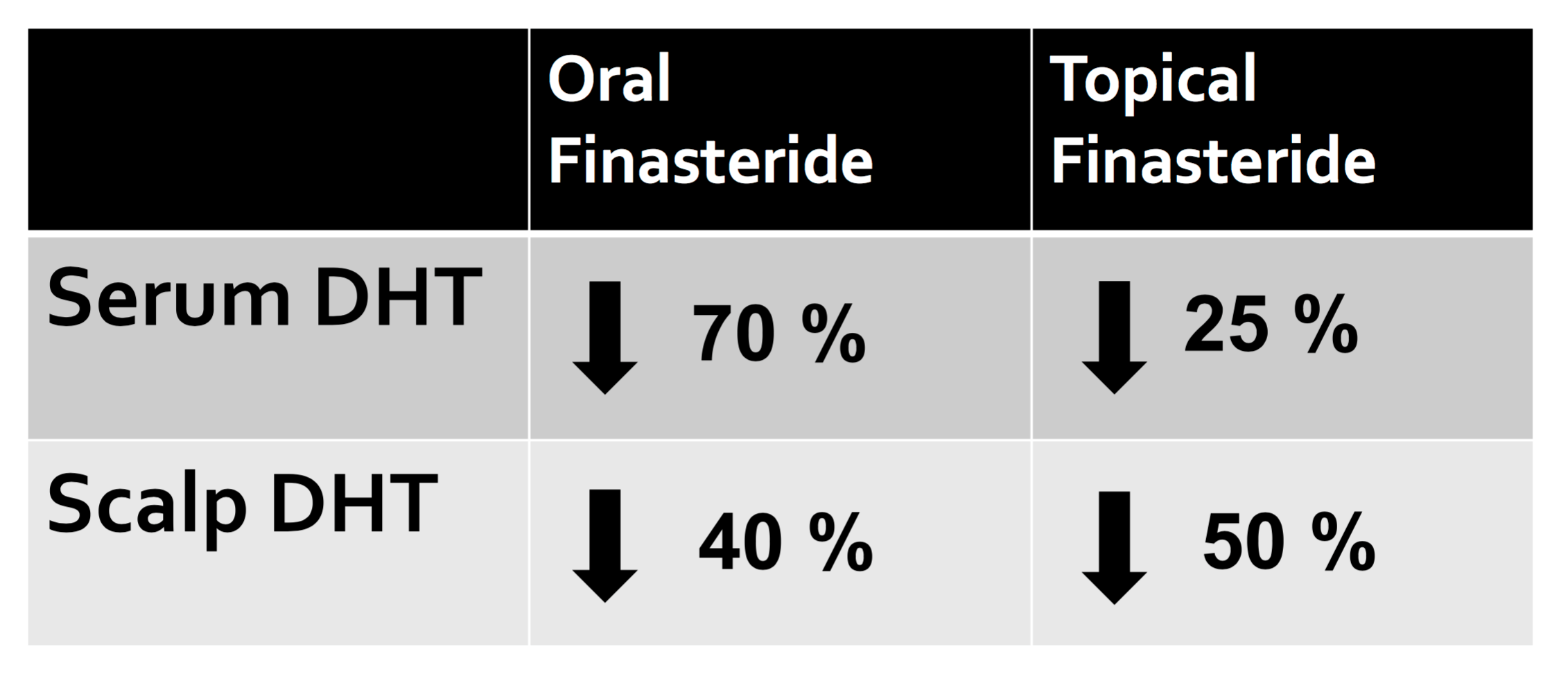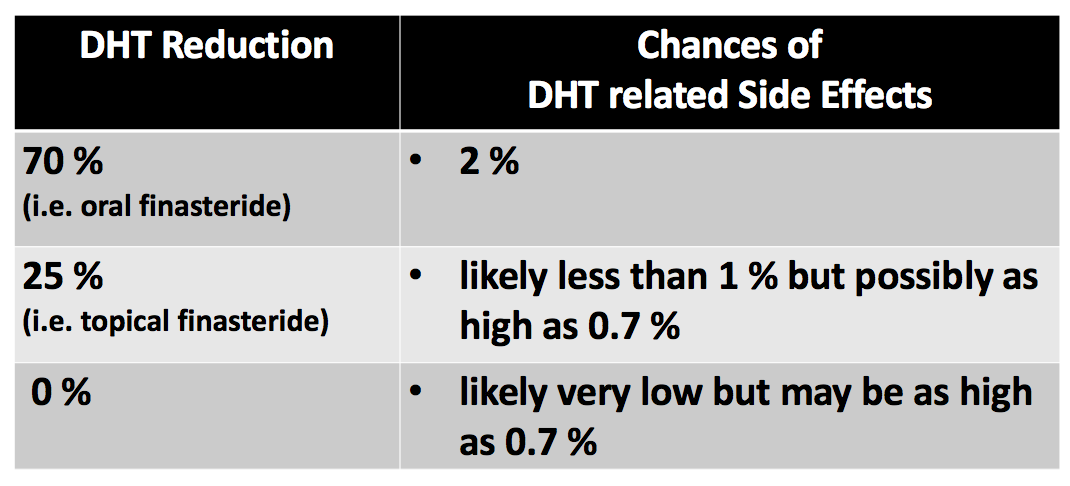Topical Finasteride: Are side effects possible?
Topical Finasteride: Don't forget the placebo studies!
If one is going to use topical finasteride, they must be 'prepared' for the possibility of side effects. For patients to use topical finastseride (or physicians to prescribe topical finasteride) with the complete expectation that it comes with zero chance of side effects is simply incorrect. The "chances" of side effects in my experience are certainly very, very, very low (probably well under 1 in 1000) and much, much lower than oral finasteride. But they are likely not zero especially if one considers that even placebo pills have side effects! Side effects with topical finasteride have not been reported to date.
Topical finasteride: What is the risk of side effects?
Common sense dictates that someone will have a side effect to topical finasteride. Whether it's 1: 1000 men or 1 in 10,000 or 1: 1,000,000 is unknown but there is little doubt in my mind that side effects are possible. We know that DHT is still inhibited in the blood by up to 25 % with some topical finasteride formulations and about one tenth of the amount of finasteride is still absorbed. In other words, a lot less gets into the blood, but it's far from zero.
Analogies I use in my clinic
I completely understand that many physicians and many patients assume that topical finasteride is 100 % free of side effects (or at least close to it). But let's use a few analogies which help us all understand that a 25 % reduction in DHT is going to be a bit much for a small proportion of men.
Humans have a delicate physiology. There are some individuals that are sensitive to small changes in blood levels of anything. There are some individuals that are sensitive to small amounts of alcohol in the blood. Some individuals are sensitive to small amounts of caffeine.
Sexual physiology is likely even more complex. There is no doubt that some will be sensitive to small reductions in DHT. We see similar "DHT" related side effects even with saw palmetto - which is not supposed to even effects DHT at all! We even see DHT related side effects (erectile dysfunction, decreased libido) in 0.7 % of men using "placebo pills" in clinical studies - which inhibit DHT 0 %!! By age 30, about 30 % of men have some degree of sexual dysfunction. By age 50, it's 50 % , and by age 80, it's well over 80 % of men. Factor this into the 0.7 % chance of sexual-related side effects with placebo pills and it's easy to understand that at least someone is going to present with concerns about side effects from topical finasteride.
Consider now the following table. We know that oral finasteride inhibits DHT by 70 % based one studied done in the 1990s. The chances of side effects with oral finasteride are around 2 %. This includes sexual dysfunction and mood changes. A drug that inhibits DHT to no degree at all (i.e. 0%) would likely have lower chances of "DHT-related" side effects. But clinical studies using placebo pills in clinical trials of finasteride have suggested this could be as high as 0.7 %. Of course, other side effects could be possible. We are then left with considering the chances of side effects in a drug that inhibitors DHT levels in the blood by 25 %. Are the chances of side effects zero? Probably not given that not even the placebo has a 0 % chance of side effects.. But fortunately, they are likely very low. We don't yet know that number. In my experience using topical finasteride, I have formed the opinion that it is likely very low and probably well under 1:000. But what is the real number? Is is 1:1000 men? 1:10,000 men?
.Many different Topical Finasteride Formulations
If a male is very sensitive to a reduction in DHT then side effects may occur. If a formulation can be created with zero penetration into the blood then systemic DHT will not be affected. That does not exist yet. One must keep in mind that there is no "one" topical finasteride formula - there are dozens of different formulations. Some pharmacies just make it up however, they like. Polychem is studying a specific formulation. MorrF is available in India already through Intas Pharmaceuticals and consists of topical minoxidil and topical finasteride together. .
Topical finasteride is clearly safer than oral finasteride and we have used for several years in our clinic. To say it has zero possible side effects would be incorrect. In my opinion, it is just a matter of time before we hear of possible side effects. There are side effects even with placebo (and it's as high as 0.7 %!).But overall, topical finasteride is much much safer than oral finasteride. But anyone who uses it must be aware that it is off label and long term effects are not known. There have been millions of prescriptions for oral finasteride to date and well over 1 million men use it every year for treating hair loss. This does not include finasteride use in prostate issues. Compare this to the fact that there are probably under 200,000 men worldwide (maybe quite a bit less) that have used topical finasteride.
Physicians and patients need to be aware of the 'unknowns' of topical finasteride use and counsel patients on the reduced chances of side effects but the possibility that a very small proportion of men will report side effects. Overall, the drug appears to have a very good safety profile in the topical formulation.
REFERENCES
M Caserini, et. al. A novel finasteride 0.25% topical solution for androgenetic alopecia: pharmacokinetics and effects on plasma androgen levels. Int J Clin Pharm Th July 30, 2014 (1-8).
BS Chandrashekar, et. al. Topical minoxidil fortified with finasteride: An account of maintenance of hair density after replacing oral finasteride. Indian Dermatol Online J 2015 Jan-Feb; 6(1): 17-20.
S Sheikh, et. al. A new topical formulation of minoxidil and finasteride improves hair growth in men with androgenetic alopecia. J Clin Exp Dermatol Res 2015, 6:1.
This article was written by Dr. Jeff Donovan, a Canadian and US board certified dermatologist specializing exclusively in hair loss.


